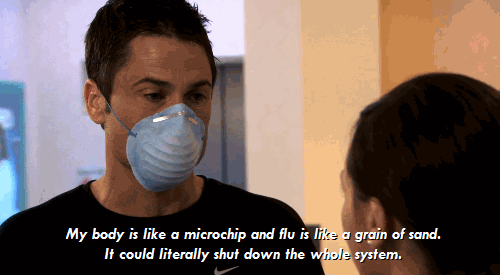How To Exercise To Boost Your Immune System
We all get sick sometimes. Even something pretty minor, like a cold or flu, can be enough to disrupt your life for a few days.
When you have a minor illness, it does more than just make you feel miserable. It interferes with your responsibilities. You might have to miss work or struggle to take care of your kids or other responsibilities.
One of the best things you can do to keep your immune system healthy is exercise regularly.
Studies have found that active people are less likely to suffer from respiratory tract infections like colds and pneumonia as well as bacterial infections.
Active people also have less severe symptoms and recover faster when they do get sick. There’s also evidence that fitter people miss less school and work due to illness.
For example, one study of about 1,000 participants found that the total number of days with an upper respiratory tract infection was 46% lower in people with high fitness levels compared to people with low fitness. That translated to about 4 fewer sick days over the 3 month study period.
Symptom severity was lower in fitter people, too. People who exercised on most days of the week had 32-41% fewer and less severe symptoms when they did get sick.
Exercise won't magically stop you from getting sick, but it can lower your risk and might make your sickness a little easier to deal with when it does happen.
How Does Exercise Boost Your Immune System?
Exercise puts your immune system on guard.
One theory for the effect of exercise on immune function is known as “immunosurveillance”.
Every time you exercise, billions of immune cells are mobilized. They are released into your bloodstream and travel around your body, especially to your lungs and gut, where they’re most likely to be needed.
Those immune cells are essentially “guarding” your body from infections. They look for viruses and other harmful substances (like cancer cells) and fight the ones they find.
That increased surveillance can last for several hours after the exercise session.
Those immune responses also have a longer-term, additive effect. Over time, several small boosts in immune function start to make the whole immune system work better.
A strong immune system can identify threats and fight them more easily.
Exercise reduces inflammation.
Chronic inflammation happens when your immune system thinks it’s constantly under threat, so it works harder than it really needs to.
Over time, inflammation damages healthy cells and can trigger disease. Exercise can help reduce chronic inflammation by releasing another type of immune cell that has an anti-inflammatory effect.
With enough of those small increases in anti-inflammatory activity, overall inflammation goes down.
Exercise helps manage body weight.
Carrying too much body fat is associated with lower immune function and chronic inflammation. Fat cells release inflammatory compounds that the immune system has to deal with.
Exercise can help reduce body fat, decreasing the extra burden on the immune system so it can work more efficiently.
How To Exercise For Better Immune Function:
Do it often.
Studies have found that people who exercise 5 or more days a week are less likely to get sick.
Each exercise session improves your immune function immediately afterward, so frequent workouts are the best way to keep your immune system working at a high level.
Make time for it.
Some studies have shown immune system benefits from exercise as short as 20 minutes. But sessions between 30-60 minutes long seem to be the most effective.
Both cardio and resistance training can give you an immune boost.
Similar post-exercise increases in immune system surveillance have been found after both cardio and strength training sessions.
If you're interested in starting a strength training program, download my FREE Strength Training 101 eBook. This guide will teach you everything you need to know to put together a strength training program for yourself.
For a more guided option, check out my Strength Training For Anxiety Program. This program has 12 weeks of done-for-you workouts, guided by an app which shows you exactly how to do each exercise. It also has bonus features designed to help you unlock the power of strength training for improving mental health and managing anxiety.
Mix it up between moderate and high-intensity exercise.
Moderate intensity exercise seems to be the most effective for ramping up the immune system.
High intensity is generally better for body fat loss, and losing fat can help decrease chronic inflammation and improve immune function on its own. A good compromise is to do both moderate and high-intensity exercises, varying them across the week.
Be careful with extremely intense exercise.
There’s a theory that very long and intense exercise suppresses the immune system right afterward. By "very long and intense", I mean endurance sessions lasting more than 90 minutes, or very high-intensity training.
The research on this comes from studies of elite athletes during competitions like marathons, triathlons, and ultramarathons, not your average exerciser.
However, there’s newer research that questions that idea, finding that the immune system isn’t suppressed after that kind of exercise, it just works a little differently.
Either way, if you’re doing long or intense workouts, it’s important to focus on other strategies to maintain your immune function, like good nutrition, plenty of sleep, and stress management.



